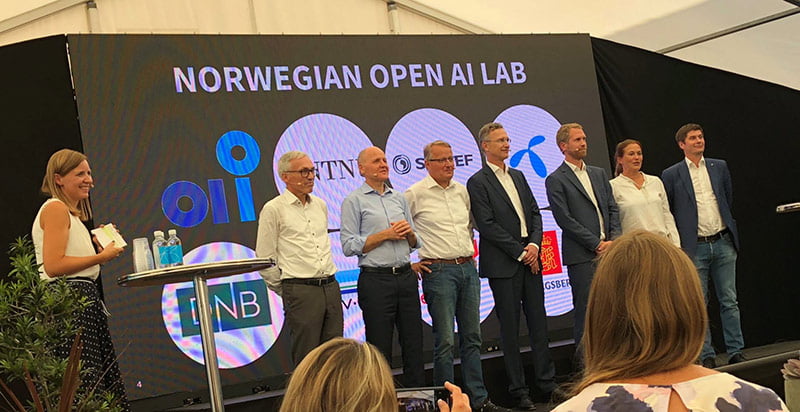
Some of Norway's biggest companies and research institutes are getting together to build competence in artificial intelligence.
Big names in Norwegian business like Telenor, DNB and Kongsberg are joining forces with Trondheim-based research powerhouses NTNU and SINTEF to seek out opportunities in AI and reduce the reliance on oil revenues.
The group of investors also includes energy giant Equinor (formerly Statoil) and the global classification agency DNV GL.
The first step in a collaborative approach was to establish the joint venture enterprise Norwegian Open AI Lab (NOAIL), which will develop expertise and technologies for use in Norway and for export potential.

Making a global impact
That latter point is crucial, as Norway wants to develop and deliver AI solutions that have big potential for global sales. The country has long been criticised by some for its inward focus when it comes to innovation and entrepreneurship, outside of oil and gas and the shipping industry, that is.
It's part of the reason the country has always played catch-up in the world of innovation. Norway's Nordic neighbours Sweden, Denmark and Finland are all better established in the world of technology entrepreneurship.
SINTEF CEO Alexandra Bech Gjørv told Computer Weekly that the background for the collaboration is that we are living in a highly competitive world that is fast-moving and increasingly challenging.
“It’s critical that we start to build Norway's competence within the AI domain now. Industry in Norway faces challenges and requirements that can't be solved by using off-the-shelf solutions. We must work to develop technology that can strengthen Norwegian industry’s competitive advantage.”
One of the reasons NTNU and SINTEF are so involved is that NOAIL aims to build a bridge between industry and academia. NOAIL will serve as a centre of excellence to strengthen the quality and capacity for research, education and innovation in the AI-domain.
The basis for this cooperation is the shared understanding that industry and academia will need to form a deeper bond in the AI-area for Norway to gain its much sought-after strong and sustainable international position in the global marketplace.
Where are we with AI?
Artificial intelligence and machine learning have moved from the realm of sci-fi novels into realism. But how far down the road are we? Possibly farther than you think…
IBM interviewed 30 AI experts to uncover the key elements to sparking the next AI innovation wave. All agreed that the technology has entered a period of rapid R&D.
“Faced with a constant onslaught of data, we needed a new type of system that learns and adapts, and we now have that with AI,” says Arvind Krishna, Senior Vice President of Hybrid Cloud and Director of IBM Research.
“What was deemed impossible a few years ago is not only becoming possible, it’s very quickly becoming necessary and expected.”
Experts express little doubt that deep learning will serve as a vital variable in the new AI growth equation, much as it did in the current one. However, deep learning has yet to demonstrate a strong ability to help machines with reasoning, a skill they must master to enhance many AI applications.
“The next big opportunity is to do for reasoning what deep learning did for perception and classification. Reasoning is required for a range of cognitive tasks including using basic common sense, dealing with changing situations, simple planning and making complex decisions in a profession”, states the report.
“Real machine learning is changing the world”
The South China Morning Post reported from this year's Consumer Electronics Show (CES) that much of what was promoted as AI was actually natural language processing rather than machine learning, but the stories were there.
“Despite not being obvious at the CES, machine learning is having a lot of success in the background”, said the report.
“Google’s latest AI tool, called DeepVariant, was recently used to sequence human genomes in significantly more detail than humans could manage by presenting the data as an image. It initiated discoveries of mutations that would otherwise have remained hidden.”
“Similarly at the University of Texas, researchers worked with Google’s AI tools to trawl through data from the Kepler Space Telescope after astronomers had found all they could using their existing methods. They found “extra” planets around distant solar systems that would have otherwise remained undiscovered.”
Presumably it's these type of breakthroughs that NOAIL will be aiming to make within its new lab.
Building on existing competence
Hopes are high that the new Norway lab will make get off to a flyer because the team is not actually starting from scratch.
NOAIL is an expansion of the existing Telenor-NTNU AI-Lab located in Trondheim. It builds further on the work already carried out there in the areas of innovation within artificial intelligence/machine learning and big data.
“NTNU is proud to host the Norwegian Open AI Lab. With this powerhouse, we ensure the recruitment of talented professionals and students to the field. This lab will develop tomorrow's technology and methods as well as help solve today's challenges across fields and usage areas,” says the Rector of NTNU, Gunnar Bovim.




